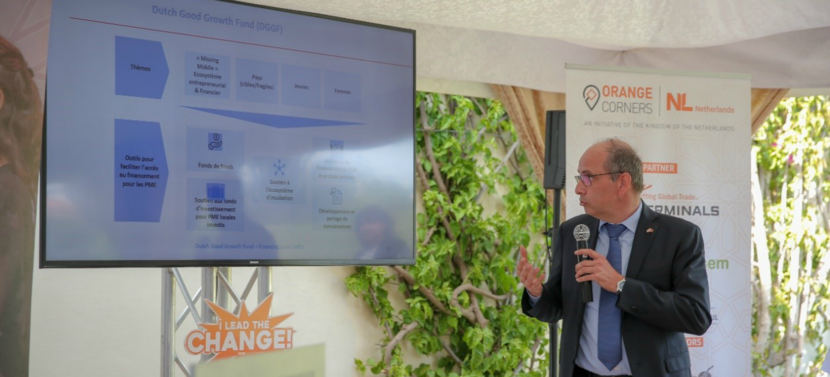Investing in the entrepreneurial ecosystem of Morocco
On 13 March 2020, the Netherlands Embassy in Morocco, in partnership with the Moroccan Center for Innovation and Social Entrepreneurship (MCISE), closed the 2nd edition of the Orange Corners Morocco programme with the award ceremony of the Orange Corners Innovation Fund (OCIF) to the 5 most innovative startups.

On this occasion the Azur Innovation Fund (AIF) was launched – an investee of the Dutch Good Growth Fund investing in innovative high-impact start-ups. Furthermore, the results of the Tidjani “Closing the Gap” study were presented. This study focuses on the "missing middle" in the entrepreneurial ecosystem in Morocco.
Orange Corners Morocco
Orange Corners Morocco is an incubation programme for young entrepreneurs – an initiative by the government of the Netherlands. This programme offers growth and development opportunities and it improves access to entrepreneurial education and incubator spaces. This helps build a dynamic entrepreneurial community capable of developing sustainable businesses and creating employment opportunities. Therefore, it contributes to the efforts made by the Moroccan government to reduce the unemployment rate of young people in Morocco.
Launch of Azur Innovation Fund
In continuation of its actions to support the Moroccan entrepreneurial ecosystem, the Dutch Good Growth Fund (DGGF), has entered into a partnership with Azur Partners for the creation of the Azur Innovation fund Fund (AIF). AIF will invest in equity and quasi-equity in innovative high-impact start-ups to support them in the development of their projects. DGGF acquired a 7-million-euro stake in AIF.
With an overall size of 350 million dirhams (approx. 33 million euro) at the time of the first closing, AIF is the largest seed fund in the history of Morocco. The Azur Innovation Fund (AIF) is the fruit of a partnership between the management company Azur Partners, the Dutch Good Growth Fund (DGGF), BAD, KFW on the international side and CCG, CIH Bank, SAHAM Assurances, BMCE BANK OF AFRICA and MASEN on the Moroccan side.
With an explicit impact strategy to finance early stage companies and to create jobs including for women and youth, Azur presents overall a strong alignment with DGGF’s objectives. The fund is expected to finance approximately 20 SMEs, including some owned and managed by young entrepreneurs, and to generate knowledge transfer to these SMEs. Azur will specifically invest in innovative ‘new economy’ sectors, which are key to the country’s economic diversification, and is expected to bring an important contribution to the development of the local ecosystem of finance opportunities and technical support for early stage companies. DGGF has played an important role in bringing the fund up to a sustainable fund size.
Presentation of Closing the Gap study
The Tidjani study “Closing the Gap” was also presented during the launch event of AIF on 13 March. The Closing the Gap series aims to improve understanding of the key challenges faced by entrepreneurs. This study focused on the “missing link” in the countries covered by the mandate of DGGF. This outcome allows DGGF to put in place both a strategy and instruments to support the efforts of local and international stakeholders to define an intervention agenda for the development of SMEs in Morocco.